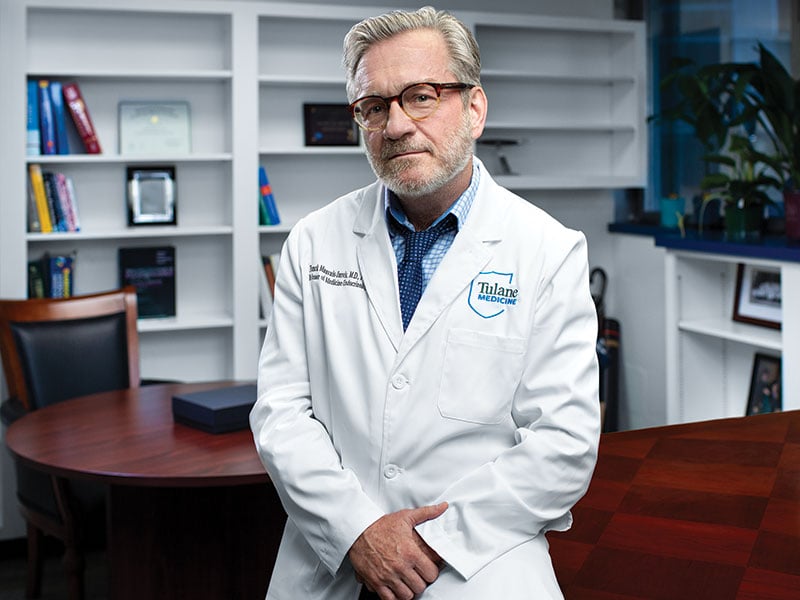Hormone Therapy Myths and Misconceptions
Tulane University physician-scientist Dr. Franck Mauvais-Jarvis is on a mission to improve the healthspan of older women and men

If you are a woman or man of a certain age, it is likely that hormone therapy is on your radar.
Perhaps you’ve watched the documentary “The M Factor: Shredding the Silence on Menopause” released on PBS at the end of 2024. Or maybe you follow one of the many doctor influencers that have popped up on social media in recent years touting the benefits of hormones (or on the darker side, spreading misinformation). It’s probable that, if you are a Generation X woman, you’re discussing hormone therapy for menopause with your friends (hot flashes are merely the tip of the infernal hellscape of symptoms). For years, the topic of hormone therapy for both women and men has been, at the very least, taboo and, at worst, shrouded in fear and confusion. However, physician-scientist Dr. Franck Mauvais-Jarvis has spent 30 years immersed in hormone therapy research and clinical practice and aims to change the conversation.
In his current role at Tulane University School of Medicine as professor of medicine in endocrinology and metabolism, Price-Goldsmith Endowed Professorship and director of the Tulane Center of Excellence in Sex-Based Biology & Medicine, as well as a staff physician in the endocrine service and director of the Hormone Therapy Clinic at the Southeast Louisiana New Orleans VA Medical Center, Mauvais-Jarvis has a unique perspective into the research and clinical sides of hormone therapy.
“Since the 2000s, until let’s say, a few years from now, there has been a period that I call the Dark Ages,” says Mauvais-Jarvis, referring to the now infamous 2002 Women’s Health Initiative Study (WHI). “These results were misrepresented and misinterpreted; some of the statistics were even false [and this] has led to where we’ve been the last 20 years — a fear of hormones.”
The WHI study contributed to various myths that Mauvais-Jarvis and like-minded doctors and medical scientists are on a mission to dispel. The first is that estrogen causes breast cancer. Mauvais-Jarvis says in the WHI study, women without a uterus who took estrogen alone actually had a lower risk of breast cancer and that the minimum risk, which Mauvais-Jarvis says is “not even significant,” was due to the synthetic progestin medroxyprogesterone acetate. “Today, we know that menopausal hormone therapy does not — I repeat, does not — increase the risk of breast cancer.” The second myth is that hormone therapy leads to heart disease. To the contrary, when researchers re-examined the WHI data, they discovered that hormone therapy decreased the risk of heart disease in younger women. The third myth, which Mauvais-Jarvis describes as more of a misconception, is that until recently in the United States, physicians were using conjugated equine estrogen, or estrogen derived from the urine of pregnant mares (Premarin), and medroxyprogesterone acetate, a synthetic progesterone. “These drugs are poison,” says Mauvais-Jarvis. “I never use them. But the bioidentical hormones, the ones that are structurally identical to those produced by the ovary, estradiol and real progesterone, they produce absolutely no increased heart disease or breast cancer.”
While there are often risks to taking certain medications, Mauvais-Jarvis says with bioidentical hormones, estradiol and progesterone, the myriad benefits outweigh the minimal risks. “If you take oral bioidentical estradiol, the protection is that it blocks hot flashes, it prevents osteoporosis, it prevents diabetes in the first 20 years, it probably prevents heart attack, it prevents depression, it prevents Alzheimer’s, it hydrates the skin,” he says.
When it comes to testosterone, the myths date to 1966 when Charles Huggins won the Nobel Prize in Physiology or Medicine for his research on the hormonal treatment of prostate cancer. The first myth relates to Huggins’ conclusion that higher testosterone increases the risk of prostate cancer, but more recent studies do not support this finding. “If you look at the literature between 1941 and now, there’s not one paper, not one scientific clinical study that shows you that testosterone increases the risk of prostate cancer,” says Mauvais-Jarvis. “In fact, older men who have low testosterone are at increased risk of prostate cancer and men who have normal testosterone are not at increased risk.” The second myth is regarding testosterone and heart disease. It’s true that synthetic anabolic steroids, which Mauvais-Jarvis describes as a structurally changed form of testosterone that many may confuse with natural testosterone, can increase the risk of heart disease. But, recent studies have shown that testosterone is neutral or may be beneficial to heart function. Mauvais-Jarvis cautions against testosterone therapy for men prior to age 50 who do not have children, because it can cause sterility. The benefits in older men who have low testosterone and symptoms, however, include maintaining sexual health, muscle mass, bone strength, protecting from abdominal fat, plus prevention of depression, Alzheimer’s and anemia.
“I consider menopause hormone therapy and testosterone therapy with bioidentical hormones after 50 as the only effective anti-aging therapies,” says Mauvais-Jarvis. “They’re not going to make you live longer, but they are going to [help] you live in good shape until the last day. It’s quality of life, it’s healthspan, not lifespan.”
